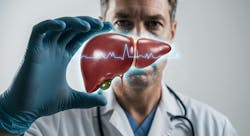AI can predict certain forms of esophageal and stomach cancer
In the United States and other western countries, a form of esophageal and stomach cancer has risen dramatically over the last five decades. Rates of esophageal adenocarcinoma, or EAC, and gastric cardia adenocarcinoma, or GCA, are both highly fatal.
However, Joel Rubenstein, M.D., M.S., a research scientist at the Lieutenant Colonel Charles S. Kettles Veterans Affairs Center for Clinical Management Research and professor of internal medicine at Michigan Medicine, says that preventative measures can be a saving grace.
Rubenstein and a team of researchers used a type of artificial intelligence to examine data regarding EAC and GCA rates in over 10 million U.S. veterans.
Their findings were published in Gastroenterology.
Rubenstein and his team developed and tested the Kettles Esophageal and Cardia Adenocarcinoma predictioN tool, called K-ECAN for short.
“K-ECAN uses basic information already readily available in the EHR, like patient demographics, weight, previous diagnoses and routine laboratory results, to determine an individual’s risk of developing esophageal adenocarcinoma and gastric cardia adenocarcinoma,” said Rubenstein.





